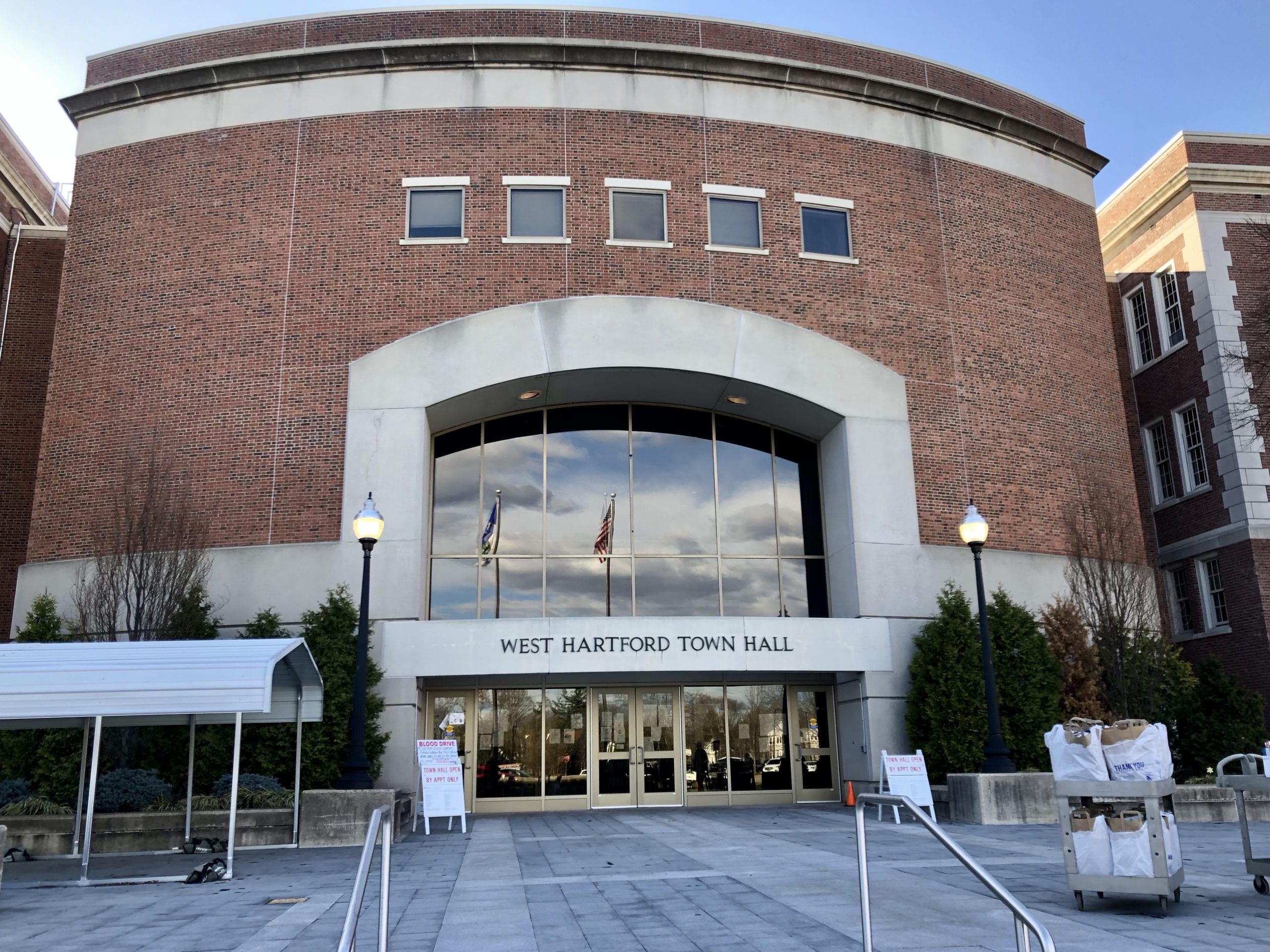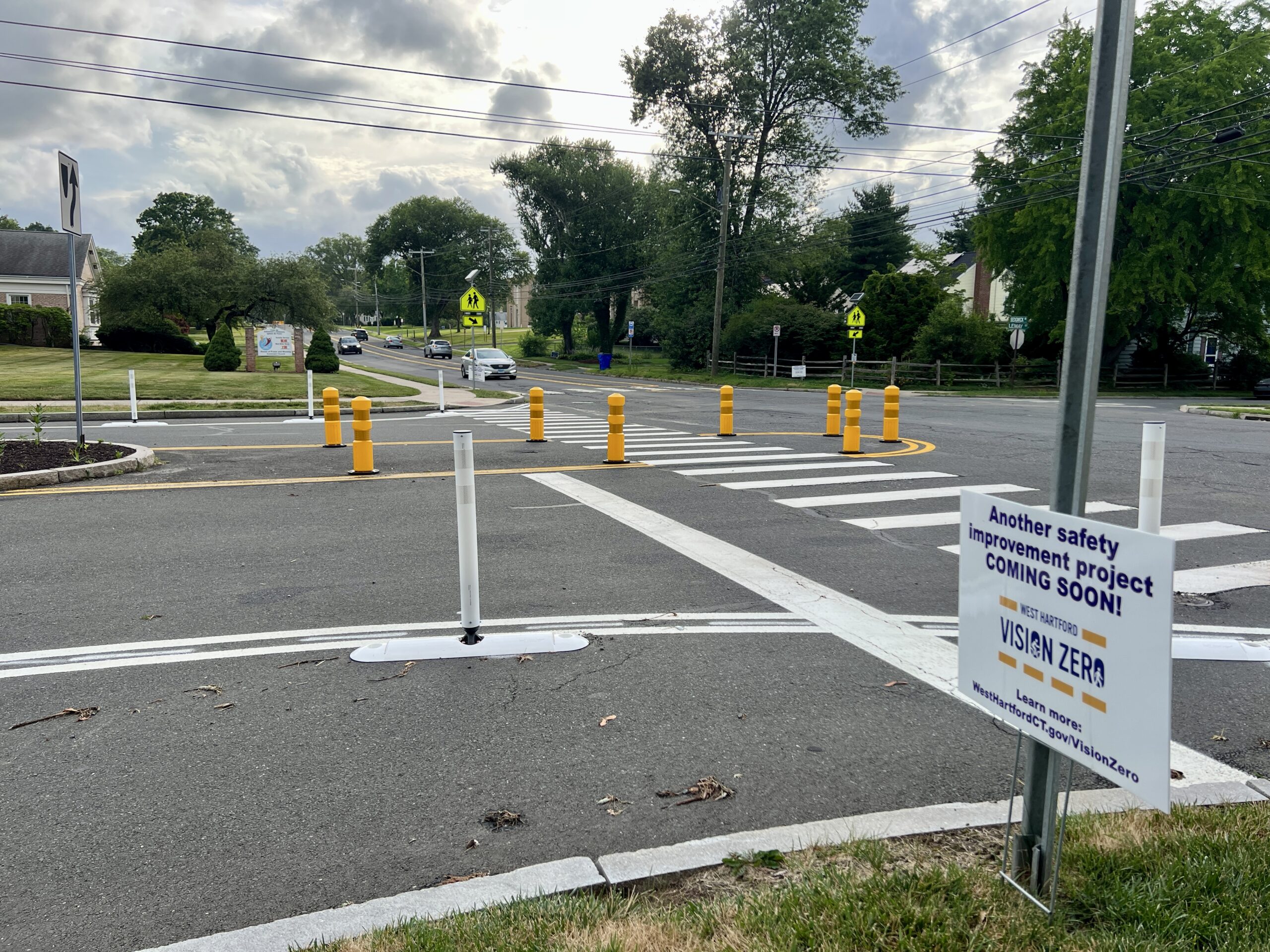West Hartford Board of Education Adopts Educational Equity Policy

Audio By Carbonatix

Front entrance of West Hartford Town Hall. Photo credit: Ronni Newton (we-ha.com file photo)
The West Hartford Board of Education unanimously adopted a new Educational Equity Policy at its June 1, 2021 meeting.
By Ronni Newton
The West Hartford Board of Education unanimously adopted an Educational Equity Policy last week, reaffirming its commitment to equity and anti-racism and codifying efforts that have been ongoing for several years into a document that will guide governance and also serve as a lens for future policy decisions.
The Educational Equity Policy addresses several goals for advancing equity, including a fair and just allocation of budget monies and goals for recruitment and staffing, as well as for curriculum, co-curricular, and extra-curricular activities, and professional development.
The Board’s three-member Policy Committee – comprised of Democrats Amanda Aronson and Lorna Thomas-Farquharson, and Republican Liz Wilcox – worked in conjunction with Director of Equity Advancement Roszena Haskins as well as members of the district’s “One Community for Equity” network of parents/caregivers, educators, and community partners to draft the policy, and took into account input from the public as well as final revisions to the policy were made.
It’s a statutory duty for the West Hartford Public Schools Board of Education to reduce “racial, economic, and social isolation,” Wilcox said as she introduced the second reading of the policy, which has been developed over the course of the past year but represents work that has been ongoing.
“Clearly our work in the realm of equity advancement has been progressing for some time,” Wilcox said. The creation of the equity policy has been a deliberate process of “codification of our work over the last six years,” and is a “living document” that will evolve and is intended to guide governance.
In addition to setting a budget and selecting and administering the work of the superintendent, a primary role of a board of education is to set policy, Thomas-Farquharson said. “Policy serves as a road map for the school district,” she said, noting that the equity policy is a “breathing livable document – not one and done, a continuous process.”
Work still remains to be done, she said, and as that progresses it will be important to proceed with openness and accountability.
Aronson, who read aloud the text of the policy – which can be found as a PDF below – noted that the committee “used the word ‘equity’ intentionally because equity helps achieve equality … built into the very essence of equity is strengthening.”
The Educational Equity Policy includes the West Hartford Public Schools mission statement: “To inspire and prepare all students to realize their potential and enhance our global community.”
The policy also includes in the text the “Equity and Anti-Racism Vision” previously adopted by the district in 2020, which recognizes that all students are not the same: “We, the members of the WHPS, dedicate ourselves to the pursuit of equity. Equitable schools are those that value and honor ALL in our community as unique individuals capable of maximizing their true potential. We make a solemn promise to identify and dismantle all elements of systemic racism and historical inequities. We vow to clear paths, with a relentless duty to those in traditionally marginalized groups. We pledge to partner with ALL families in the service of the success of each child. ”
During the public communications session at the beginning of the hybrid meeting, three residents, Kate Kappes, Brian Flemming, and Frank Frisoli, called in to offer comment, all expressing concern that in their opinion a policy based on equity, rather than equality, would lead to discrimination and special treatment and stating that it was an attempt at indoctrination.
“It’s racism in disguise,” Kappes said.
Superintendent of Schools Tom Moore said it’s important for everyone to feel welcome in the schools, and that’s the essence of this policy. “We need our kids to come in and feel they’re at home, because we can’t have kids who are so worried and disgusted with their lives because of what goes on outside that we have to worry about their safety, from self or others,” he said.
“Yes, we’re trying to indoctrinate kids – in kindness, decency, caring for each other,” said Moore.
While as a country the U.S. has traditionally stressed and celebrated equality, the country’s history, its inception, included enslavement. It’s time to have age-appropriate discussion, Moore said.
This policy commits the district’s teachers to making sure that all kids feels safe and welcome, Moore said. “To make sure that we don’t pretend things are equal for every child because they’re not … but we’re going to lift them up without tearing them down.”
Updates to the original draft of the policy, which were incorporated into the final version approved by the Board, include the use of legal terminology to state the characteristics that are protected by law.
The policy uses the term “strive” rather than “meet,” in terms of budget and resource allocation, Aronson said, because the schools are only one piece of meeting all needs of students.
“Strive” was also used in the section about ensuring a climate and environment where “students, staff, and families are valued, respected, and heard,” because it’s not possible to make that a promise, but the district can commit and strive to develop that climate and environment, Aronson said.
The policy doesn’t specify plans for implementation, but does state that through the district’s “process of continuous quality improvement” accountability and metrics will be determined to identify and analyze inequities related to all students, and in particular “those groups that have been traditionally and historically marginalized.”
The district “will collect data using equity-conscious measures to support clear reporting on goals and outcomes,” the policy states.
Haskins said the students from Hall’s DECA Student Association, who gave a presentation at the Board meeting regarding the importance of teaching financial literacy to all students, “are a testament to our commitment of equity-based programs.”
Like what you see here? Click here to subscribe to We-Ha’s newsletter so you’ll always be in the know about what’s happening in West Hartford! Click the blue button below to become a supporter of We-Ha.com and our efforts to continue producing quality journalism.
